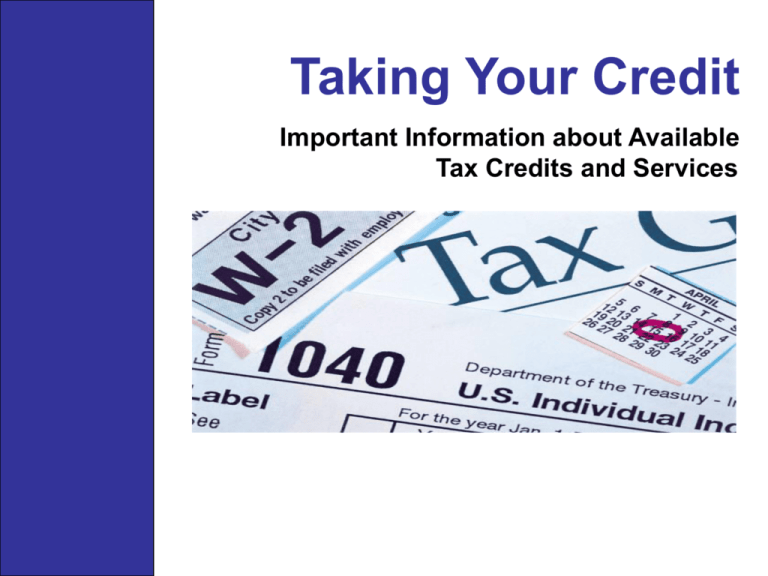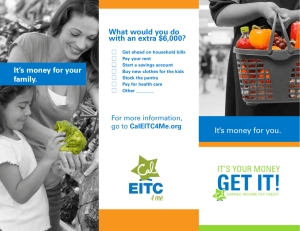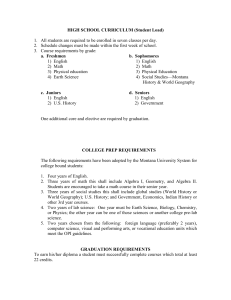Tax credit presentation for disabled and disabled service community
advertisement

Taking Your Credit Important Information about Available Tax Credits and Services Disclaimer • Information we will provide today is for outreach and information and referral purposes. • For answers specific to the tax obligations for yourself or your clients, contact a tax preparer at a free tax site or a tax professional. • Information provided is not meant to replace advice from qualified professionals. Taking Your Credit Important Information about Available Tax Credits and Service • Your clients may qualify for tax credits • Your clients may take advantage of free, high-quality tax preparation services • Your clients won’t be disqualified for Medicare, Medicaid, or SSI benefits Types of Available Tax Credits • • • • • Earned Income Tax Credit Child Tax Credit Child and Dependent Care Credit Credit for the Elderly and Disabled Retirement Savings Contribution Credit • Education Credits • Additional Credits Earned Income Tax Credit • Must have valid Social Security Number • Earned income from employment, self employment, or another source. • Between ages 25-65 • Children are not required to claim EITC Encourage Your Clients to File regardless of amount of Earned Income!!!! • Publication 596: Earned Income Credit EITC, Continued Earned Income & AGI must each be less than Tax Year 2011 Maximum Credit No One Two Three Childr Chil Childr or en d* en* more Childr en* $43,998 $5,751 ($49,078 MJT) $40,964 *See IRS definition of Qualified Child. ($46,044 MJT) $5,112 Investment income must be $3,150 or less for the year. $36,052 ($41,132 MJT) $3,0 94 Child Tax Credit • Available to taxpayers who have a child living with them under the age of 17 • You can be eligible even if you owe no taxes!!! Encourage Your Clients to File • Publication 972, Child Tax Credit Child and Dependent Care Credit • Did you pay for child or dependent care so that you can work (or look for work)? • The credit can be worth over $2000, depending on amount paid and your income • Certain restrictions do apply • Publication 503, Child and Dependent Care Expenses Credit for the Elderly and Disabled • For those who are 65 and older, or permanently and totally disabled • If disabled, must have taxable disability benefits • Up to $1,125, though difficult to qualify for • Publication 524, Credit for the Elderly or Disabled Retirement Savings Contributions Credit Did you contribute to a 401(k), 403(b) through your employer, or an IRA you established on your own? You may qualify for a credit of up to $2000. • Form 8880, Credit for Qualified Retirement Savings Contributions Education Credits • American Opportunity Credit – for students (or their parents if they are supporting the student) for all four undergraduate years. • Lifetime Learning Credit – for some of the expenses incurred while taking courses to improve your job skills. • Tuition Deduction versus Credit – the education credits may be more advantageous. Encourage Clients with Education Expenses to go to a free tax program! • Publication 970, Tax Benefits for Education Additional Credits for Individuals Who Are Disabled • Higher standard deduction for those that are legally blind • Deduction for impairment-related work expenses • Medical expenditures deduction, including home improvements related to accessibility • Publication 907, Tax Highlights for Persons with Disabilities Tax Credits Will NOT Lower Your Benefits! * • ALL Federal tax refunds and advanced tax credits received after January 1, 2010 qualify for a 12 month resource exclusion (POMS SI 01130.676) • State treatment of refunds have a mixed treatment as follows: • Adult Assistance Manual SR 94-04 – refunds are excluded from income and resource tests. •Family Assistance Manual SR94-04 – IRS or state reimbursements of taxes withheld in excess of actual tax obligation – excluded from income, but counted resource. Follow up with a benefit specialist if your client intends to save resources and receive services from Family Assistance. Meeting Tax Obligation • Some clients may owe taxes • Accessing the services puts them in better position to take corrective action • Consequences of garnishment are real • Services are available from IRS Tax Payer Advocate • Penalties only occur if you ignore it. Accessing Free Tax-Preparation Services • Approximately 65 free tax sites available in New Hampshire through VITA/TCE. • Go to irs.gov for site locations. • Dial 2-1-1 • Some sites allow appointments; others allow walk-ins. Call ahead! • Use the website, or call the IRS for sites near you: 1-800-829-1040 • IRS article, Free Tax Preparation for You by Volunteers What Taxpayers Should Bring to Tax Preparation • Original Social Security cards for you, your spouse, and all dependents (as well as their birthdates) • A valid picture ID of you, and your spouse if married • All 1099s and W2s for the current tax year • Year-end documentation of Social Security benefits (the PINK form), if applicable • A copy of last year’s tax return, if available • If divorced or separated and claiming a child, bring custodial form 8332 • Bank routing number and account number for direct deposit, if you have a bank account Other Helpful Documentation to Bring Anything that says: IMPORTANT TAX DOCUMENT • 1098 tax statement for mortgage interest • 1098 student loan interest statement from lender or log-in information • 1099 bank statement • Receipts for work-related, medical, or educational expenses • Receipts for any home improvements related to a medical or disabling condition • Receipts for any tax preparation fees you paid for in previous year • Any automobile registrations • Proof of child-care expenses as well as the providers SSN or EIN, and address of the provider • Proof of any real estate taxes you paid • Proof of charitable donations When in doubt, BRING IT! Benefits of Free Tax Prep • All preparers are IRS Certified Volunteers • Preparers can help you get the credits you deserve • Some sites can help you file prior year taxes, if necessary (and if eligible, help you get your refund!) • Sites e-file, and do direct deposit, so clients can have their money in as little as a week!!!! Additional Benefits • Low and Moderate Income Property Tax Relief (filing period May 1-June 30) • Matched savings accounts for people that work (IDA programs) • Property Tax Exemptions (community specific) based on disability, elderly, military families, etc. Each community is different. • Other guidance on ways to save money You’re Not In It Alone • Contact 2-1-1 • Internal Revenue Service www.irs.gov 800-829-1040 • CASH Coalition of New Hampshire www.cashcoalitionnh.org, or cashcoalitionnh@gmail.com






